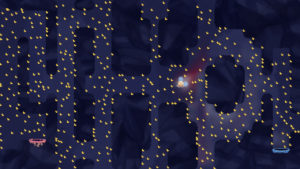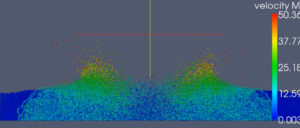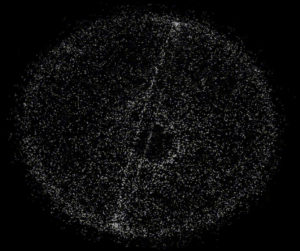Let's Play! Simulated Physics for Games
This course connects numerical simulation, interactive components, creativity, Kaiserschmarrn and hiking to a playful, yet very instructive, project work in several teams. Modeling and simulation are two components that are closely related to reproducing real-world phenomena on a computer. While accurate modeling is required for an appropriate representation of the reality being described, simulation utilizes the developed models to allow predictions such as weather forecasts or combustion processes in new engines, or to simulate circumstances that are inaccessible to experiments such as black holes.



Molecular Dynamics Simulation

Large Scale Deterministic Debris Simulation
The process of numerical simulation is highly interdisciplinary since it is necessary to find a mathematical model of the actual real-life system, discretize this model, run it on a computer, and then transfer the results back to real life. Thus, the intention of this course is to bring together students from different scientific fields such as mathematics, computer science, physics, chemistry, and engineering and, in particular, from computational or simulation technology programs. Therefore, you should be willing to cooperate with people from other fields of research, to discuss their ideas, and present a topic from your area of expertise in a team with other students.
Following the success of previous years, we will schedule a moderate number of such presentations during the seminar and focus on a project during which you will implement your own simulation-based game.
The idea for the project of this year is the development of an interactive game on top of a particle simulation, where particles could be anything from atoms (https://en.wikipedia.org/wiki/Molecular_dynamics) over rocks (https://en.wikipedia.org/wiki/Discrete_element_method) to celestial bodies or virtual entities in a fluid flow approximation (https://en.wikipedia.org/wiki/Smoothed-particle_hydrodynamics). Of course, there is flexibility to adapt to the background and preferences of the participants. Some general goals:
- The input (Keyboard / Mouse / Kinect) of the player (who will probably be a professor) is analyzed in real-time and leads to an interactive modification of the simulation.
- Rigid bodies are influenced by the simulation and interact with it. For example, a player avatar that wants to reach a goal.
- It's the player's task to either modify the simulation (e.g., play with boundary conditions) or fight against it (e.g., move up against a stream of moving particles) to win the game.
Over the course of Ferienakademie you will learn about:
- Numerical modeling and simulation of particles
- Time discretization
- Full-stack software development
- Real-time visualization
- Coordination of a team of 20-30 people
- Lots of Kaiserschmarrn (and hiking!)
As in the last years the course language is something similar to English—so don't worry if your English is not perfect, you won't be alone!
The course is open for early Bachelor's up to advanced Master's students.
